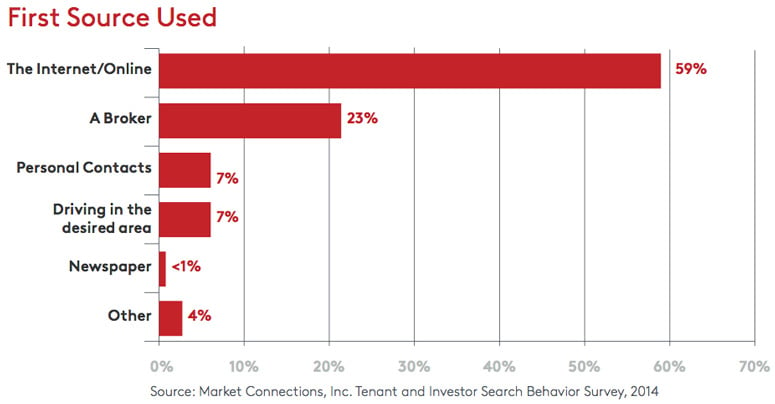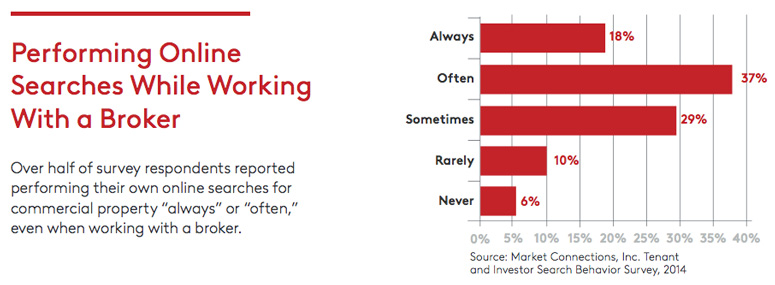By Alex Musetti
It should come as no surprise that the internet is one of the most widely used tools for searching for real estate. Companies like Zillow have secured real estate’s foothold on internet search patterns and consumers are usually better off for it. What is less understood is how companies use the internet to aid them in their corporate real estate matters.
The commercial real estate industry differs from the residential industry in myriad ways, and internet trends and behaviors toward them are no different. A joint study conducted by Google and LoopNet in late 2014 reveals some interesting figures surrounding how tenants and buyers of commercial real estate use the internet in their search for properties.
Starting Online

The study begins by looking at the first source used by tenants and investors when they initiate their commercial real estate search. It reports that 59% of respondents first go to online tools to search for properties, while only 23% start out using a broker. This is a startling figure for any professional who works in our industry because public online sources are known for being incredibly inaccurate, incomplete, and out of date.
What the study does not discuss is whether those 23% of tenants who turn to a broker first are working with brokers who represent landlords and list space, or if they are seeking out tenant representatives who will have a fiduciary responsibility to them, not the landlord. Posing this question causes yet more alarm because, unless respondents are specifically searching for tenant-rep brokers, they are limiting their results in at least one of two ways.
First, tenants searching for space using online tools that are created by landlords and their brokers will find results that are incomplete if not inaccurate, which could potentially skew their perception of the market (LoopNet’s content, for example, is provided exclusively by listing brokers and landlords). Second, for the tenants who use a broker, if they choose one that represents landlords (known as a “dual agent”) rather than a tenant representative, then they will likely limit themselves to a single listing brokers’ properties, which is an even smaller representation of the market.
Only a fraction of the 23% of tenants who start their search with a broker will be savvy (or lucky) enough to choose a tenant-rep broker. This group of tenants will benefit from working with market professionals who have a fiduciary, legal, and ethical responsibility to show them all the spaces that fit their needs, and to negotiate on their behalf and no one else’s.
Staying Online

The study also looked at respondents’ sentiments toward the use of a broker. It reveals that more than 50% of tenants search for space on their own time even while they are working with a broker. The most common reason given for doing such independent searches was to ensure that no properties were missed (or that their broker was not omitting options to show them). This suggests that many tenants have an inherent mistrust of brokers due to fears about a broker’s neglect, allegiance, fiduciary responsibility, or integrity.
This reaffirms why it’s so important for tenants to engage tenant-rep brokers who work for tenant-rep firms (not listing firms), which exclusively represent tenants, not landlords, thus preventing any conflicts of interest. Further, tenants should seek out licensed brokers, as they possess a great deal more accountability and expertise than people who call themselves “brokers” but only hold a salesperson’s license. This will ensure that the broker truly does have a legal obligation to represent the best interests of the tenant and no one else.
Lastly, tenants should understand that a broker who has made the decision to work exclusively as a tenant representative in addition to holding his or her broker’s license has made a clear and distinct choice to shed the potential conflicts of interest that arise when working for a firm that represents both tenants and landlords.
Key Takeaways
The rise of online commercial real estate tools has led to a dramatic shift in the way companies search for space. While these new tools make it easy to access more commercial real estate information than was ever publicly available in previous decades, they can also contribute to a false sense of confidence in the tenants who rely on them. The fact is, no online search tool can compare to the deep market knowledge, relationships and expertise that a tenant representative can provide. Not to mention the much more complete and accurate listings that tenant-rep brokers have access to, which will help make sure you don’t miss out on that perfect space.
As our lives move more and more online, the attractiveness of commercial real estate search tools like LoopNet will continue to draw tenants to research properties online. That’s fine. The important thing is that tenants understand what those tools are lacking, and don’t base an important business decision on poor information sourced from free online websites. With so much information overload, it’s never been more important for corporate tenants to work with tenant representatives who they can trust to protect their interests.
Alex Musetti is an executive managing director Hughes Marino, a global corporate real estate advisory firm that specializes in representing tenants and buyers. Contact Alex at 1-844-662-6635 or alex@hughesmarino.com to learn more.










